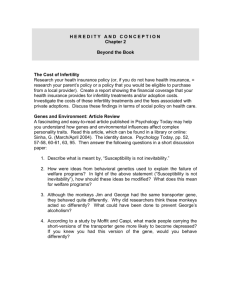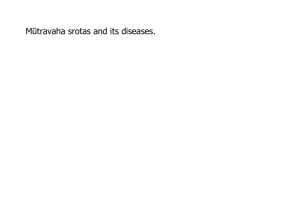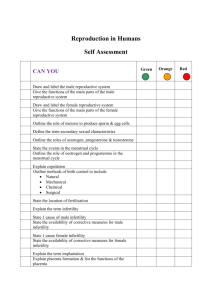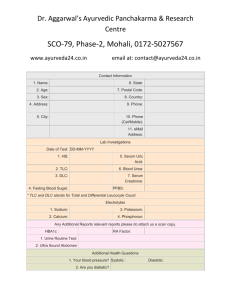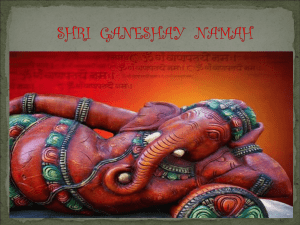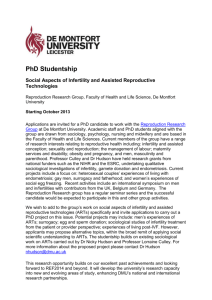cntctfrm_2f63bf14c955cd33d1e7897db9fa0ed1_ROLE OF
advertisement
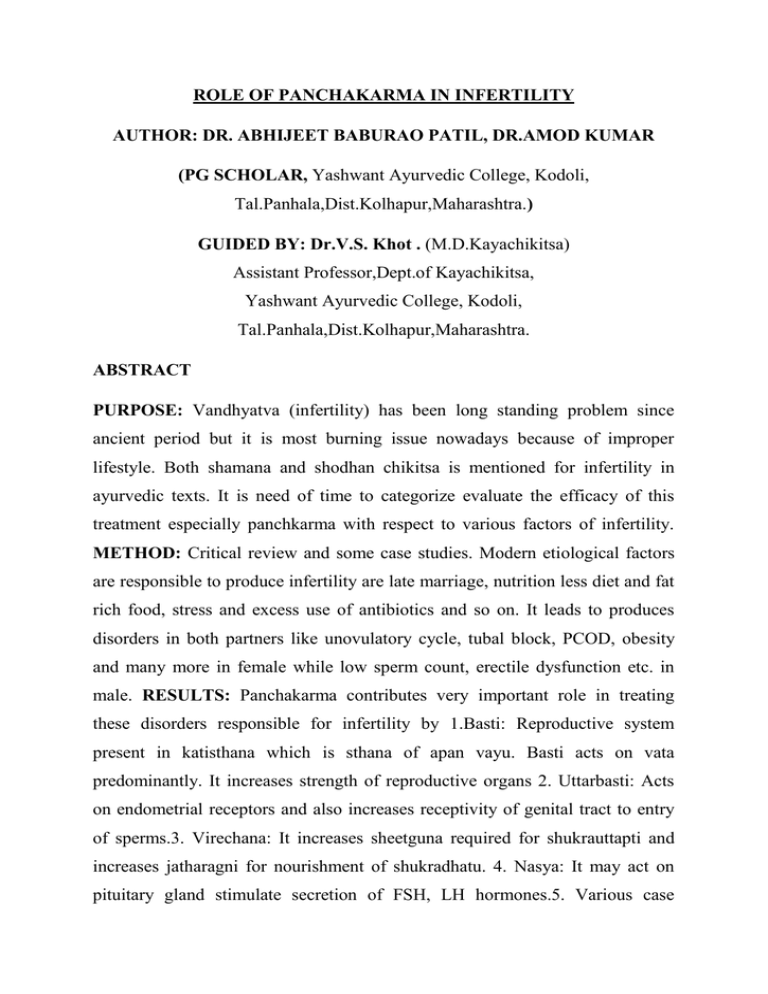
ROLE OF PANCHAKARMA IN INFERTILITY AUTHOR: DR. ABHIJEET BABURAO PATIL, DR.AMOD KUMAR (PG SCHOLAR, Yashwant Ayurvedic College, Kodoli, Tal.Panhala,Dist.Kolhapur,Maharashtra.) GUIDED BY: Dr.V.S. Khot . (M.D.Kayachikitsa) Assistant Professor,Dept.of Kayachikitsa, Yashwant Ayurvedic College, Kodoli, Tal.Panhala,Dist.Kolhapur,Maharashtra. ABSTRACT PURPOSE: Vandhyatva (infertility) has been long standing problem since ancient period but it is most burning issue nowadays because of improper lifestyle. Both shamana and shodhan chikitsa is mentioned for infertility in ayurvedic texts. It is need of time to categorize evaluate the efficacy of this treatment especially panchkarma with respect to various factors of infertility. METHOD: Critical review and some case studies. Modern etiological factors are responsible to produce infertility are late marriage, nutrition less diet and fat rich food, stress and excess use of antibiotics and so on. It leads to produces disorders in both partners like unovulatory cycle, tubal block, PCOD, obesity and many more in female while low sperm count, erectile dysfunction etc. in male. RESULTS: Panchakarma contributes very important role in treating these disorders responsible for infertility by 1.Basti: Reproductive system present in katisthana which is sthana of apan vayu. Basti acts on vata predominantly. It increases strength of reproductive organs 2. Uttarbasti: Acts on endometrial receptors and also increases receptivity of genital tract to entry of sperms.3. Virechana: It increases sheetguna required for shukrauttapti and increases jatharagni for nourishment of shukradhatu. 4. Nasya: It may act on pituitary gland stimulate secretion of FSH, LH hormones.5. Various case studies also show significant results by panchkarma management in infertility. Conclusion: From this review and case results it is clear that panchakarma can treat infertility successfully. KEYWORDS: Panchakarma, Infertility, Uttarbasti, Ayurveda. INTRODUCTION: Vandhytava Nashtartava Vidyat! i.e. a woman whose artava is perished is called vandhyatva is mentioned in ayurveda. Vandhyatva (infertility) has been long standing problem since ancient period but it is most burning issue nowadays because of improper lifestyle. The mean global incidence of infertility among general population is estimated as 16.7%.Both shamana and shodhan chikitsa is mentioned for infertility in ayurvedic texts. But it is need of time to categorize and evaluate the efficacy of this treatment especially panchkarma with respect to various factors of infertility. MATERIALS AND METHOD: Critical review and some case studies are presenting here. Nidana for vandhyatva: 1. Mithya aahar vihar 3. Mata pita beej dushti 2. Aartavdushti 4. Purvajanmakrit Papkarma Modern etiological factors are responsible to produce Infertility: 1. Early and Late marriage: Not well development of reproductive organs. 2. Nutrition less & fat rich food: No nourishment of body, tempers ovary function. 3. Over use of antibiotics and excess use of chemotherapy agents, surgical procedures cause infertility. 4. Excess use of painkillers: Endocrine disrupter property. 5. Excess use of cosmetics: Blocks the hormones. 6. Tight clothing & mobile: Overheating of testis leads to low sperm count. 7. Smoking & alcoholism: Lowers motility of sperms and lowers LH hormones. 8. Improper hygiene of genital organs: Causes infection of genital tract. 9. Stress: Loss of energy and enthusiasm to do sex. Loss of libido. Affects HPO axis leads to impairment of ovarian function. Due to above causes disorders produce in both partners: Female Male 1. Unovulatory cycle 4.Tubal block 1. Low sperm count 2. Acidic pH of vagina 5.PCOD 2. Premature ejaculation 3. Menstrual irregularity 6. Obesity 3. Loss of motility of sperm Ayurvedic aspect of treating infertility: In Ayurveda both shodhan and shaman chikitsa are mentioned, but here we will see shodhan therapy i.e. panchakarma. BASTI: Reproductive system present in katisthana which is sthana of apan vayu. Action of basti is predominantly on vata dosha and pakvashaya. Garbhashaya is made up of vayu and akash mahabhuta. In basti mainly tikta rasatamak dravya (vata+akash mahabhuta pradhan) are used though they are vatavardhak, acts as catalyst to take the medicine to vata sthana. Sneha in basti acts as catalyst in absorption of other drugs medicinal properties. Since Basti is targeted at regulating the Apana Vayu it facilitates timely release of ovum and also good production of sperms. UTTARBASTI: It contributes very important role in treating infertility because it has direct local action in reproductive system. It also helps to increase receptivity of genital tract to entry of sperms. Ovaries contain receptors which receive hormones secreted by hypothalamus and pituitary gland. The drug stimulates these receptors, so that proper ovulation occurs in each cycle. 1 Uttar Basti relieves tubal block by lysis of adhesions and relieves obstruction.2 In cervical factor, drug administered locally in the cervix and absorbed by cervical epithelium due to sukshma property of drug. The lipid soluble drug is passively diffused across the membrane in the direction of its concentration gradient. The rate of transport is proportional to lipid: water partition coefficient of the drug. The more lipid soluble, higher is the concentration and quicker diffusion. In this way altered cervical pH can be corrected by Uttar Basti.3 Basti and Uttarbasti dravyas for different diseases: Tubal Block: 1. Kasisadi Tail + Kshar Tail 2. Kumari Tail 3. Shatavari Ghrit uttarbasti.4. Tila Tail + saindhav + gomutra + mamsarasa basti. Acidic pH of vagina: 1. Balamool + milk = ksheerpak + sukhoshna jal.2. Kankshi jal 3. Panchvalkal kwath. Menstrual irregularity or unovulatory cycle: .Phalagrita 2. Shatavari ghrit 3. Kashmaryadi ghrit, Madhutailik basti. PCOD or Uterine Fibroid: 1. Dashmool Tail + Devdarvyadi kwath 2. Phalaghrit Miscarriages: 1. Gambhari + Kutaj = kwath + ghrita 2. Bala tail 3. Jivantyadi anuvasan yamak basti 4. Chatusneha anuvasan basti, Guduchyadi tail uttarbasti.5. Udumbaradi tail uttarbasti. Obesity: Lekhaniya gan basti, Yapan basti. Ovarian factors: Prajasthapan gan dravya siddha ghrit uttarbasti. Vrishya basti. Cervical factors: Ashwagandha ghrit and phalghrit uttarbasti. Uterine fibroid: Panchatiktaguggul ghrit uttarbasti. Unexplained infertility: Sheetkalyanak ghrit uttarbasti Erectile dysfunction: Ashwagandhadi Tail uttarbasti. Low sperm count: Shukrakarak basti, Drakhashadi niruha basti, Vrishya basti. VIRECHANA: It acts on vitiiated Pitta dosha decreases ushna guna of pitta and increases sheet guna required for formation of shukradhatu. Impaired agni by vikrit pitta also crrected by virechana. Agni is required for prakrit nirmirti of shukra dhatu. Obstructing dosa kapha is removed and vata dosa that gets obstructed by kapha dosa is also cleared off by virechana. Dravya: Mahatiktak ghrit, Trivrit Leha. NASYA: It acts directly on brain, pituitary because “NASA HI SHIRASO DWARAM”. No one cranial nerve is exposed to exterior than olfactory receptors. The mucosal epithelium is sensitive to variety of stimuli. The ghrita and tail easily absorbed through mucosal epithelium. It helps to stimulate the pituitary to secret FSH & LH hormones. In Female: Chandan Tail, Bala Tail, shatpushpa tail, phala ghrit. In Male: Narayana Tail. CASE STUDIES which was treated by ayurvedic treatment: 1. Case of Tubal Block: Kaphavrutta vata, female suffering from PID. History of Tuberculosis. Used Treatment: first given yogabasti. Then uttarbasti with Kumari Tail. Action: ushna, tikshna medicines acts by lekhana karma. Tila tail acts as garbhashaya shodhak, vranapachak, vranashodhak. Result: 70% tubal block removed. 2. Case of Acidic pH of vagina: All is normal, but sperms are killed in vagina. Investigation shows pH of vagina is more acidic. Used treatment: Avagah sweda with kankshi + water uttarbasti with panchavalakal kwath. Action: Amliyata of yoni due to vitiation of pitta. Panchavalkal kwath having kashay rasa,sheetvirya. This helps in pittashaman by sthanik shodhan. Kankshi acts as jantughna. Result: Patient is conceived in next cycle. 3. Case of Low sperm count: Hetu: fast food, stress, overload of work, late meal. Used treatment: Snehapan with mahatiktak ghrit 4 days. Virechana with trivrit leha. Basti with bala tail. Action: Pitta and kaph dushti leads to indigestion. Improper formation of ras dhatu so further dhatus are not nourished. Mahatiktak ghrit helps in piittashaman and virechan remove vitiated pitta. Bala tail basti helps in dhatu vriddhi. Result: Sperm count is increased at significant level. DISCUSSION The important cause of infertility is adoption of modern life style. Ayurveda can treat infertility by various methods of panchakarma procedures like basti, virechana, nasya using different ayurvedic formulations. Proper selection of drug and time of administration is very essential for getting the desired results. CONCLUSION This review summarizes and evaluates the evidence underlying the use of panchakarma for female infertility. From review of ayurvedic texts and case study results it is clear that panchakarma can treat infertility successfully. REFERENCES 1. Savaliya Hetal. Comparative study of shatpushpa churna and shatpushpa taila Uttar Basti in the management of vandhyatva wsr to viphala artava. Postgraduate thesis, Jamnagar: GAU;2005 2. Shukla Kamayani. A comparative study of uttar basti of yavakshara taila and kumara taila in tubal blockage. Postgraduate thesis, Jamnagar: Gujarat Ayurveda University;2010. 3. Chetna M Kodinariya, Pandya MA. A comparative study of Shatavari ghritha and Goghritha Uttar Basti in the management of vandhyatva w.s.r. to cervical factor. AYU.2008; 29: P 144-48. 4.Acharya Vidhyadhar Shukla, Vd. Ravidatta Tripathi, Charak Samhita, Choukhambha Sanskrit Pratishthan, Delhi.edi.2007. 5. Vaidya Haridas S. Kasture, Ayurvediy Panchakarma Vigyaniyam, Baidynath Ayurved Bhavan Ltd.Ilahabad. 6. Dr.Nirmala Joshi, Ayurvedic Concepts in Gynaecology, Choukhambha Sanskrit Pratishthan, Delhi.edi. 2006. 7. D. C. Dutta, Textbook of gynecology, New Central Book Agency (P) Ltd. Edi.5th 2008.
